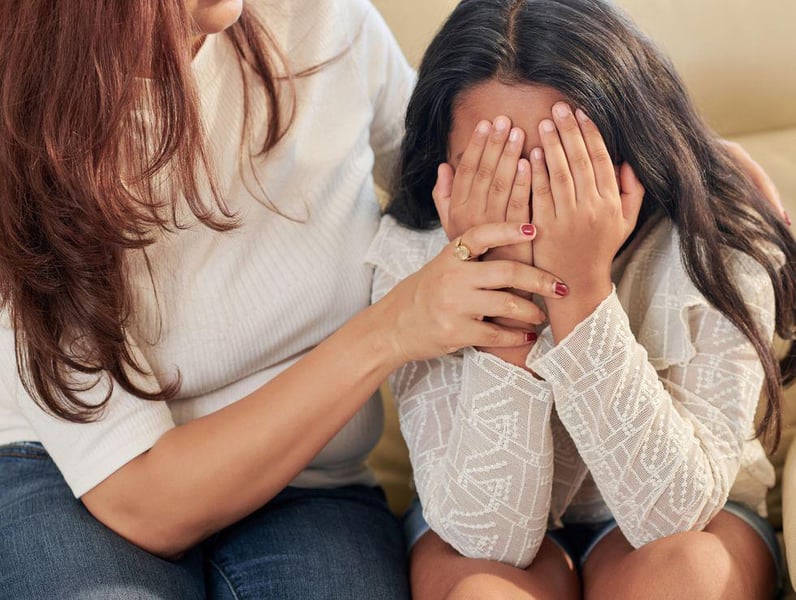Get Healthy!

- Denise Mann
- Posted May 3, 2023
Among Kids With Autism, Girls Are More Prone to Anxiety Disorders Than Boys
Boys are four times more likely to be diagnosed with autism than girls are, but girls may be more likely to experience anxiety alongside the disorder than boys, new research reveals.
Anxiety tends to travel with autism, which is characterized by problems with social interaction, communication and behavior. About 1 in 36 kids in the United States has autism, according to the U.S. Centers for Disease Control and Prevention.
Now, this latest study suggests that the developmental disorder might play out a bit differently in girls.
"Autistic females have higher rates of anxiety disorders than autistic males, especially in presentations of anxiety that are distinct to autism and may be more challenging to identify," said study author Christine Wu Nordahl, director of the Autism Phenome Project.
"This is especially important because we now know that there are effective treatments for anxiety in autistic youth that can greatly improve their quality of life, but the promise of effective treatments "¦can only be realized if we can accurately identify anxiety,"she added.
For the study, 112 kids with autism (89 boys and 23 girls) underwent brain scans when they were toddlers and at three other time points. Their parents were interviewed about their anxiety symptoms when these kids were 9 to 11 years old, to help tease out whether anxiety was related to autism symptoms or a distinct entity.
Overall, the girls had higher rates of anxiety than the boys, particularly in the presentations of anxiety that are distinct to autism, including fear of change. They also had higher rates of more traditional forms of anxiety, such as social anxiety, generalized anxiety and separation anxiety, the study showed.
The children in the study with distinct anxieties showed slower growth in their brain's fear center (amygdala) from ages 3 to 11 compared to children without anxiety (both with or without autism). By contrast, autistic kids with traditional forms of anxiety showed a larger right amygdala than children with distinct anxieties or no anxiety.
"Anxiety can be separate from autism, but a lot of times parents and clinicians may say the worry and anxiety are symptoms of the autism,"Nordahl said.
How can you tell the difference?
Many kids with autism fear change and may react when something happens that is outside of the norm. This is different from anticipatory anxiety or worry, she said. "With this type of anxiety, kids really worry about something ahead of time, such as taking a different route to school versus just reacting to the different route by having a meltdown,"Nordahl explained.
Treatments such as cognitive behavioral therapy -- which aims to change how people react to stress -- can help kids with autism better cope with anxiety.
"If we can reduce their anxiety, we can improve kids' quality of life separate from their autism,"Nordahl said. This starts with correctly diagnosing the type of anxiety.
The findings were to be presented Wednesday at the International Society for Autism Research meeting, in Stockholm. Findings presented at medical conferences should be considered preliminary until published in a peer-reviewed journal.
"This is a really important and significant study,"said Andy Shih, chief science officer of Autism Speaks, a non-profit autism awareness organization.
Girls with autism seem to experience anxiety at a higher rate than boys, he said, and this correlates with findings on brain scans.
"Not only is there a difference in the type of anxiety, but there is a physical underpinning for this observation," Shih said. "The sex differences in autism are an ongoing conversation, and this robust evidence really points to the need for being more thoughtful about anxiety and how we recognize and treat it in boys and girls with autism."
More information
Autism Speaks has more on the link between autism and anxiety disorders.
SOURCES: Christine Wu Nordahl, PhD, director, Autism Phenome Project, Beneto Foundation Endowed Chair, MIND Institute, and professor, department of psychiatry and behavioral sciences, University of California-Davis Health, Sacramento; Andy Shih, PhD, chief science officer, Autism Speaks, New York City; May 3, 2023, presentation, International Society for Autism Research meeting, Stockholm




